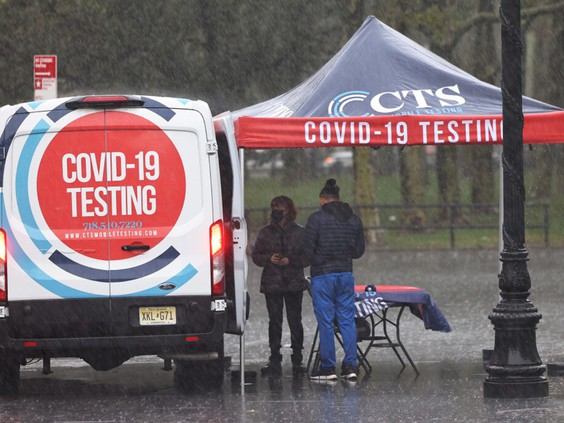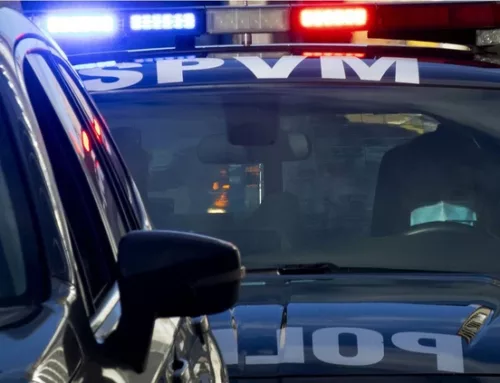Devika Desai
November 8, 2021
-National Post
Nearly four dozen people in New Jersey have been hit with terrorism charges as part of the state’s campaign to criminalize threats of COVID-19 transmission.
If convicted, the 45 people could each face up to 10 years of prison time and a $150,000 fine, in what defence attorneys of the accused have called a “miscarriage of justice” targeting the poorest and most vulnerable residents of the state.
Denise Lewis, 28, told the Guardian she had been arrested while walking on the streets in April 2020, with warrants related to failure to pay traffic tickets and an incident in which she had “escaped” from a police vehicle.
She had been a witness to a fight but left the back of the patrol car, her attorney Logan Terry told the Guardian.
After being taken into custody, police say Lewis coughed “in close proximity” to the arresting officers and stated she had COVID-19, even though no dashboard, body or in-station videos have shown the encounter.
Lewis had no criminal history prior to this exchange, but now she faces a terrorism charge after the officer’s allegation.
“This is a poor person,” Terry said. “If this was a rich white lady this would not be happening. This is a poor black lady and they’re going to stick it to her, and I think it’s wrong.”
The most recent plea agreement offered to Lewis would see her spend five years in prison.
The first of the terrorist threat charges in New Jersey were brought on March 14, 2020 against a Bergen County woman, who allegedly coughed on an officer during a domestic violence incident.
The former N.J. attorney general defended the charges to the Guardian in June, stating that this is how officers know they’re supported. “By ensuring that prosecutors filed serious charges in each of these cases, we let our officers know that we have their backs and that we appreciate the dedicated and professional way that they have met the challenges of this unprecedented emergency,” Gurbir Grewal said.
He has since joined the Biden administration as the director of enforcement for the Securities and Exchange Commission.
The charges continued to be laid for the next nine months, including December 2020 when a Secaucus, N.J., man who was arrested for drunk driving coughed on police and said he had COVID-19.
Since then, at least some of the accused have remained in jail or have entered prosecution deferment programs. Others have told the Guardian that their lives have been “ruined” by the charges, which many have called unjust.
“People lives (sic) are being ruined because of these kind of charges with no proof of having COVID at all,” said Lewis, the woman arrested on warrants related to traffic tickets, via an email. “How can u (sic) assault someone who hasn’t gotten Covid?”
The charges are similar to the HIV transmission prosecutions in the 1990s, in which people were charged for threatening to transmit the virus or AIDS.
New Jersey prosecutors, according to the Guardian, specifically cited precedents set by the 1990s HIV charges, in an attempt to justify action against those who threatened to spread COVID-19.
One example was State v. Smith, in which HIV-positive inmate Gregory Smith was sentenced to 25 years in prison for threatening to kill corrections officers by biting or spitting on them — even though it was widely known by then that HIV could not be spread through saliva.
Last year, a northern New Jersey man spent eight months in jail awaiting indictment. When arresting officers asked him he had any health problems, he answered: “I have corona.”
“It’s obviously not a threat in the common definition of the threat nor in the legal definition of the threat, and it was a direct response to their questioning,” said the man’s attorney.
After release, he was asked to return to jail to get a COVID-19 test.
“It was just so absurd and offensive to me for him to go in (to jail) to prove he was a COVID-negative, when obviously he could get tested on the street,” the man’s attorney said, describing it as an example of how the pandemic has been used to hurt “some of the most vulnerable people.”
Chad Flanders, a U.S. law professor, told the Guardian that New Jersey’s decision to prosecute the accused was “unusually aggressive” and presented a mismatch between the severity of the crime and that of the penalty.
“The idea we’re going after knuckleheads with 10 years and $150,000 fine – there’s sort of a disconnect to me,” he said.




